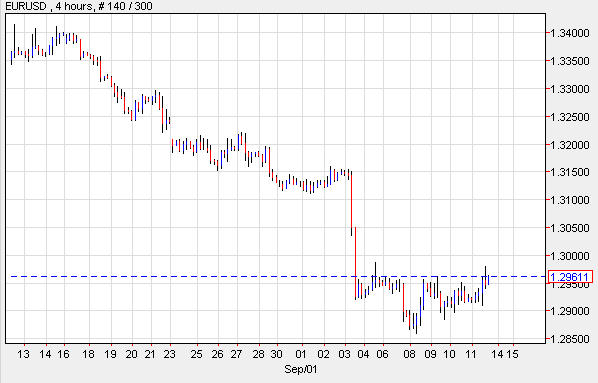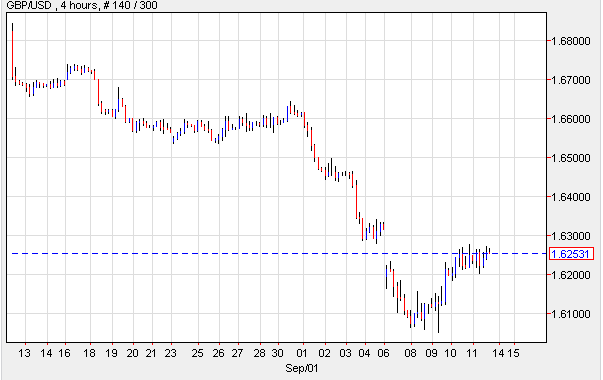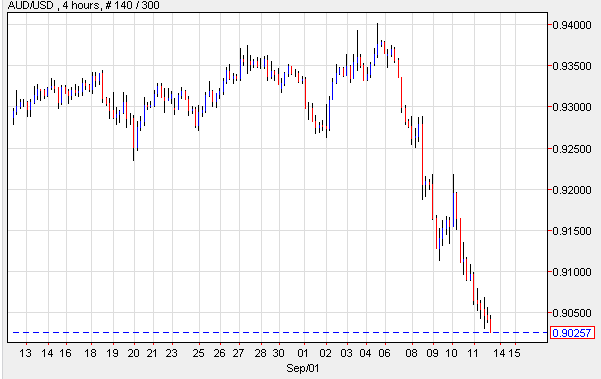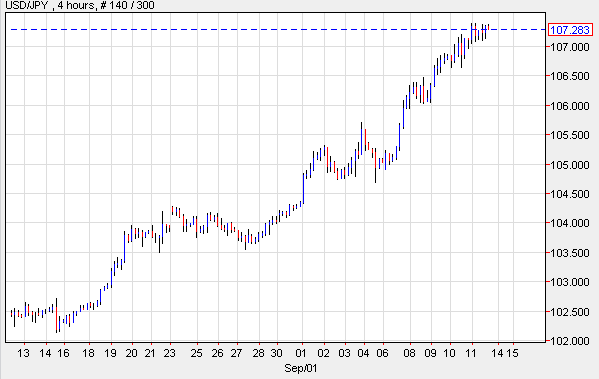The U.S. Dollar continued to rally against the majority of its Forex peers on Friday, as speculation that the Federal Reserve may boost the interest rate sooner than it planned, increased. The Dollar Index, which keeps track of the currency's performance against a basket of Forex majors dipped 0.18 percent, but concluded the week posting gains of 0.39 percent. The greenback sustained the longest streak of gains in over 17 years. Studies by the San Francisco Federal Reserve, published last Monday denoted that the monetary authorities may be inclined towards raising the main cash rate. Metrics released on Friday confirmed that Retail Sales surged in August, and that Consumer Sentiment reached a 14-month high this month, signaling that the economy is improving. Gold, on the other hand touched the lowest price in eight months. The precious commodity plummeted to $1,228.10 a troy ounce on the New York Mercantile Exchange, but recovered some of its losses by settling at $1,231.50 towards the end of Friday. The strength of the U.S. currency normally weighs on Gold. This week, the Federal Reserve is expected to release a statement, which will supposedly contain clues on when it plans to raise the benchmark interest rate.
Analysts predict that this could be a big week in the Forex as a number of majors have reached multi-month lows or multi-month highs. Some expert traders believe that sentiment is turning risk adverse in light of events taking place around the globe. Forex strategists find that the recent currency declines and hikes were quite interesting since the market was relatively quiet. However, they believe that the lack of economic fundamentals allowed traders to digest recently released metrics from different parts of the world. This week promises to be just as interesting and perhaps even more volatile with the Federal Reserve scheduled to issue a statement; and Scotland holding a referendum. There are plenty of macroeconomic fundamentals out of the U.K., and the Bank of England is expected to issue the minutes from its recent policy meeting. Furthermore, the European Central Bank will be engaging in the Targeted Long Term Refinancing Operations, better known as the TLTRO. While analysts don't know the exact direction in which the currencies will move, they anticipate that the fluctuations may be dramatic. The Euro erased some of its losses against the U.S. Dollar after the Standard & Poor's raised Greece's credit rating by one notch, and it's likely to extend gains. The British Pound on the other hand declined to the lowest level in ten months versus its U.S. counterpart as the latest polls signaled that more people are likely to vote "yes" for Scotland's independence.
The Yen dipped to a multi-year low against the U.S. Dollar; many economists predict the Japanese currency could slump further to the downside after this week's FOMC's announcement. The Yen remains under pressure as the Bank of Japan has not indicated it plans to raise stimulus despite signs that the economy in in desperate need of action. Many say that the market will shrug of upcoming Japanese data, and the Yen will remain vulnerable to how the U.S. Dollar responds to U.S. developments.
Lastly, in the South Pacific, the Australian Dollar was severely impacted by a decline in iron ore prices, even though employment figures came in stronger than expected. The Aussie's steep declines came about on comments by economists who suspect that the release of jobs' metrics was not accurate. Many say that the Aussie's trend will hinge on what Janet Yellen, the head of the Federal Reserve will say this week. New Zealand's Dollar tumbled towards a seven-month low against the greenback after the Reserve Bank's governor intimated that the currency's strength is "unjustified." Analysts predict that the Kiwi's trend could shift depending on what the Gross Domestic Product report shows.
EUR/USD-Greece Gets Upgraded
The EUR/USD managed to post slight gains after dropping to the lowest rate since the summer of 2013. Economists say that the pair rebounded as a result of its oversold condition, and it may rally further this week, depending on what the Federal Reserve's Statement offers traders. The European Central Bank is scheduled to conduct the TLTRO. The central bank reiterated that it won't be reducing the costs of borrowing money for some time, and therefore, financial institutions should consider taking part in the TLTRO. Meanwhile, Greece received positive news from the Standard & Poor's. The rating agency stated that it will boost Greece's credit standing by one notch from B- to B, due to improvements in its financial outlook.

GBP/USD- Polls Weigh On Sterling
The GBP/USD plunged towards the lowest rate in ten months as new polls indicated a swing towards Scottish Independence from the union, a factor that reduced the appeal of the Sterling. The pair declined after leaders from the U.K.'s key political parties appealed to voters not to dissolve the union, which has lasted 307 years. Economists are worried over the effects of a vote in favor of independence, and predict that the GBP/USD could sustain further losses. The British Pound gained some support last week after the central bank's governor, Mark Carney suggested that a hike in the borrowing costs is in order, as the economy risks seeing a drop in inflation. Analysts anticipate that the consumer price inflation data could influence the markets in the days ahead, but there's no doubt that all eyes will remain on the Scottish Referendum, set to be held on September 18. The GBP/USD is likely to remain vulnerable to comments and polls throughout the week.

AUD/USD- Aussie Hit Hard
The AUD/USD was hit hard in the past few days as iron prices fell, and the Reserve Bank maintained a neutral monetary policy stance. But despite stellar employment metrics showing a drop in the level of unemployment and the creation of more payrolls than forecast, economists remained skeptical about the actual numbers issued, and wondered if they should expect a revision. The AUD/USD may climb or decline, but it will all depend on the central bank's minutes and what the Federal Reserve offers the markets in the next statement. Analysts predict that the AUD/USD could fall further if the Fed is vague in its comments, and the Reserve Bank adheres to its neutral position. The pair slumped to the lowest rate in six months after Friday's releases out of the U.S. underlined that the American economy has gained momentum.

USD/JPY- Pair At Six-Year High
The USD/JPY rallied back up to a six-year high as market participants increased wagers the Federal Reserve will wind down quantitative easing by October, and may be ready to offer clues on when it could increase the benchmark interest rate. The Yen remained under pressure after the Bank of Japan's governor, Haruhiko Kuroda stated that the policy makers would boost stimulus even if it becomes a challenge for the economy to hit the 2 percent inflation target. The Yen was also severely affected by economic data denoting that the country's Current Account failed to reach expectations, causing economists to wonder why the central bank has not expanded monetary easing.

Today's Outlook
Today's economic calendar shows that Japan's markets are closed for a Holiday. The Euro region will report on the Trade Balance. Switzerland will publish PPI. The U.S. will announce Industrial and Manufacturing Production. And Australia will release the Monetary Policy Meeting minutes.
